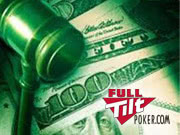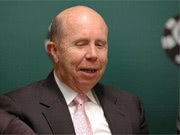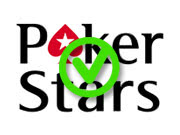 Several former US players at Full Tilt Poker have grown tired of waiting for their funds to be returned to them and decided to take matters into their own hands by filing a class action lawsuit with the US District Court South District of New York, claiming Full Tilt Poker as the defendant. The lawsuit demands not only a return of the plaintiffs’ money, but also damages for suffering that they have endured at the hands of Full Tilt’s carelessness.
Several former US players at Full Tilt Poker have grown tired of waiting for their funds to be returned to them and decided to take matters into their own hands by filing a class action lawsuit with the US District Court South District of New York, claiming Full Tilt Poker as the defendant. The lawsuit demands not only a return of the plaintiffs’ money, but also damages for suffering that they have endured at the hands of Full Tilt’s carelessness.
The court paperwork further goes on to accuse Full Tilt Poker of racketeering, stating that the only reason that players suffered losses was because executives and others associated with Full Tilt Poker willfully committed wire and bank fraud and money laundering, neglecting their customers in order to “pad their own pockets”. The plaintiffs are seeking recompense via the Racketeer Influenced and Corrupt Organization Act (RICO), which was designed in 1970 to help put an end to organized crime; by claiming that Full Tilt violated the RICO Act, the lawsuit is creating far more trouble for Full Tilt than it may initially seem. To enforce the RICO Act, the Attorney General can create a special task force aimed at investigating and uncovering any illegal operations in which Full Tilt has engaged; this gives the US government more force with which to drive the investigation into the site.
Some news sources speculate on what will become of this lawsuit after the sale of Full Tilt Poker, but class action lawsuits have a tendency to be tenacious and not simply go away when money is thrown at them, and as the RICO Act specifically covers fraud, violations of state gambling laws, and money laundering (all charges initially brought against the site in April of this year), the case itself is not without merit. A RICO indictment also means that the US Attorney General’s office can freeze assets for the company and require a performance bond (or “good faith money”), and because RICO examines patterns of behaviour for the company, the odds of a win for the plaintiffs are solid. As the plaintiffs stand to gain not only their money back, but also treble damages (damages that are multiplied by a factor of three due to the willful nature of the crimes), it is unlikely that they will back down.
Curiously enough, the suit not only names the CEOs and companies that are a part of FTP, but also brings charges against many of Team Full Tilt, including Phil Ivey, who had dropped his own suit against Full Tilt less than 36 hours before. The lawsuit claims that Ivey is a partial owner of Full Tilt (with at least 5% stake), and that he and the other professional players “represent the Full Tilt brand” and “all own an equity interest in– and are directors of– the Full Tilt and/or the entities that operate under the Full Tilt name”.
This class action suit appears to be a continuation of the charges brought against the site in April, as it cites the same evidence as the initial case, which claims that Full Tilt created a series of sham companies and used them to make US player money harder to track. The case states that this was done without the knowledge of US customers (a claim which is at best very questionable), but US law does not hold players accountable in this instance, stating that it is the responsibility of the banks and the companies to ensure that they only receive funds through legal channels.
- To read the full text of the court documents, click here.
 Within days of the complete
Within days of the complete  American poker star Jack Binion is rumoured to be the newest Full Tilt Poker investor, which could potentially work out in everyone’s favour, if the circumstances play out right. While sources state that Binion has been to Ireland to negotiate the acquisition of the company, nothing is certain at the moment.
American poker star Jack Binion is rumoured to be the newest Full Tilt Poker investor, which could potentially work out in everyone’s favour, if the circumstances play out right. While sources state that Binion has been to Ireland to negotiate the acquisition of the company, nothing is certain at the moment.  PokerStars, which has been at the center of the poker media spotlight since last April’s Black Friday, has released a public statement about Full Tilt’s recent license suspension. Full Tilt Poker had its licence revoked on June 29th by the Alderney Gambling Control Commission (AGCC) and has been barred from accepting new players, accepting money from players, allowing players to withdraw funds, or allowing players to take part in any kind of poker game on the site (the AGCC was pretty specific that Full Tilt Poker isn’t going to be doing much of anything for quite some time). Although the Full Tilt website states that the site is merely down for maintenance, the site will not be back up until the net hearing, scheduled for late July.
PokerStars, which has been at the center of the poker media spotlight since last April’s Black Friday, has released a public statement about Full Tilt’s recent license suspension. Full Tilt Poker had its licence revoked on June 29th by the Alderney Gambling Control Commission (AGCC) and has been barred from accepting new players, accepting money from players, allowing players to withdraw funds, or allowing players to take part in any kind of poker game on the site (the AGCC was pretty specific that Full Tilt Poker isn’t going to be doing much of anything for quite some time). Although the Full Tilt website states that the site is merely down for maintenance, the site will not be back up until the net hearing, scheduled for late July. Three events came to a close on June 29th, 2011, Day 29 of this year’s World Series of Poker, while an additional three events saw their players push a little closer to a WSOP bracelet.
Three events came to a close on June 29th, 2011, Day 29 of this year’s World Series of Poker, while an additional three events saw their players push a little closer to a WSOP bracelet. The online poker world grew a little smaller today, as Full Tilt Poker was officially shut down. Players are now even more concerned, and for good reason– while the site (along with PokerStars and Absolute Poker) and its executives faced charges of bank fraud, illegal gambling, and money laundering, the initial response to this news was an assumption that this would mean the end of the sites in the United States. Two months after the infamous “Black Friday” in April, Full Tilt Poker had its eGambling license revoked by the government of Alderney, one of the Channel Islands that lies between England and France and the location of Full Tilt Poker. A follow-up meeting will be held at 10 in the morning on Tuesday, the 26th of July, 2011 in London; this regulatory hearing will address any rebuttals or presentation of additional materials that could potentially reverse the decision to revoke Full Tilt’s license.
The online poker world grew a little smaller today, as Full Tilt Poker was officially shut down. Players are now even more concerned, and for good reason– while the site (along with PokerStars and Absolute Poker) and its executives faced charges of bank fraud, illegal gambling, and money laundering, the initial response to this news was an assumption that this would mean the end of the sites in the United States. Two months after the infamous “Black Friday” in April, Full Tilt Poker had its eGambling license revoked by the government of Alderney, one of the Channel Islands that lies between England and France and the location of Full Tilt Poker. A follow-up meeting will be held at 10 in the morning on Tuesday, the 26th of July, 2011 in London; this regulatory hearing will address any rebuttals or presentation of additional materials that could potentially reverse the decision to revoke Full Tilt’s license.